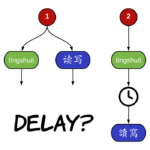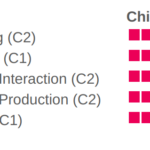Articles in the ‘Advanced’ category Page 17
-
Training your Chinese teacher, part 4: Writing ability
Writing ability is largely determined by how much you read, but there are many areas where a teacher can help you through valuable feedback. This article looks at this process, discussing what activities to engage in and what role your teacher can play.
Read → -
Should you learn to speak Chinese before you learn Chinese characters?
The question of whether or not to delay learning Chinese characters in favour of the spoken language is an interesting one many arguments in favour of both approaches. For most people setting out on their Chinese learning journey, focusing on important aspects of the spoken language, such as pronunciation, is certainly more important than learning characters.
Read → -
How to get honest feedback to boost your Chinese speaking and writing
Feedback is important because it can show you how to not use the language and highlight things you hadn’t noticed before. But getting honest feedback when learning Chinese is not as easy as it seems. This article starts by looking at why feedback is necessary, and continues by discussing how to get honest feedback.
Read → -
Are mnemonics too slow for Chinese learners?
Mnemonics are very effective for certain types of learning, but how effective are they for learning Chinese? This article is the first of two that looks at the effectiveness of mnemonics, focusing on the question of speed. Are mnemonics too slow to be really useful in the context of using a foreign language?
Read → -
Learning Chinese words: When quantity beats quality
Any teacher, student or researcher will agree that vocabulary is important, but how should you go about it? What’s the goal? This article argues that a common problem for learners of Chinese is that they spend too much time learning too few words, and that they would be better of aiming for quantity over quality in many cases.
Read → -
When spaced repetition fails, and what to do about it
Spaced repetition software can boost your vocabulary learning significantly. The idea is to schedule each review as late as possible, but not so late that you forget the answer. This sounds good in principle, but when it comes to learning languages, just barely being able to come up with the right word is not enough!
Read → -
Dealing with Chinese characters you keep mixing up
The more Chinese characters you learn, the harder it becomes to keep similar characters distinct. If you’re not careful, a pair or group of characters can generate a lot of extra work and frustration. The solution is to trace your errors and figure out why you get the characters wrong and, then deal with them decisively!
Read → -
文字冒险游戏及其在对外汉语教学中的应用
Interactive text games work well for individual learners, but they are also excellent in
Read →
a classroom setting. This article gives you everything you need as a teacher to play Escape! in your classroom. This article is in Chinese, but there is an English version too. -
Text adventure games and how to use them in the Chinese language classroom
Interactive text games work well for individual learners, but they are also excellent in a classroom setting. This article gives you everything you need as a teacher to play Escape! in your classroom. A Chinese version of this article is available as well.
Read → -
How to figure out how good your Chinese is
Figuring out how good your Chinese is can help you focus on the right areas and evaluate your learning methods. But language assessment is hard! This article describes how and why you should assess how good your Chinese is, and gives you tools and resources to do so.
Read →









